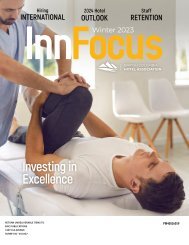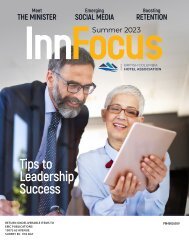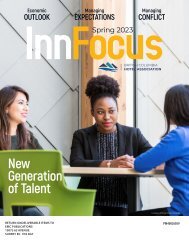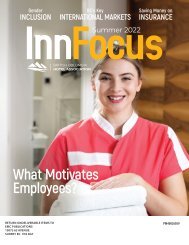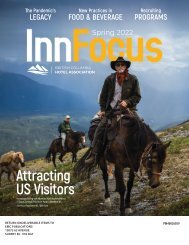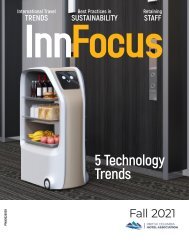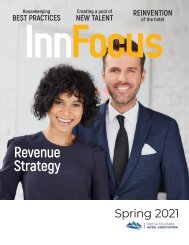InnFocus Summer 2021
InnFocus magazine for hoteliers in British Columbia
InnFocus magazine for hoteliers in British Columbia
You also want an ePaper? Increase the reach of your titles
YUMPU automatically turns print PDFs into web optimized ePapers that Google loves.
Understanding Traveller<br />
BEHAVIOUR<br />
Financial<br />
LEADERSHIP<br />
The Potential of<br />
PRODUCTIVITY<br />
The LGBT+<br />
Community<br />
PM40026059<br />
<strong>Summer</strong> <strong>2021</strong>
contents<br />
200-948 Howe Street,<br />
Vancouver, BC V6Z 1N9<br />
T 604-681-7164 1-800-663-3153<br />
www.bcha.com<br />
How the LGBT+ Community Will Lead the Recovery<br />
And what you should do to welcome them at your property<br />
Cover Photo Courtesy of Brentwood Bay Resort<br />
@BCHotelAssociation<br />
@bchotelassoc<br />
@BCHotelAssociation<br />
bchotelassociation<br />
BCHA Team<br />
Ingrid Jarrett<br />
President & CEO<br />
Mike Macleod<br />
Director Member<br />
and Business Development<br />
Karissa Bourgeault<br />
Project Manager & Board Liaison<br />
Kelsey Millman<br />
Communications Manager<br />
Dylan Tomlin<br />
Energy Analyst<br />
Samantha Glennie<br />
Member Services Coordinator<br />
2020/<strong>2021</strong> Board of Directors<br />
Executive Committee<br />
Bryan Pilbeam – Chair, Delta Kamloops<br />
Jonas Melin – Vice Chair,<br />
Harbourfront Pinnacle Hotel, Vancouver<br />
John Kearns – Past Chair,<br />
Sheraton Vancouver Guildford Hotel<br />
David McQuinn – Treasurer, Coast Bastion, Namaimo<br />
David MacKenzie – Director,<br />
Pemberton Valley Lodge<br />
Stephen Roughley – Director,<br />
Marriott Victoria Inner Harbour<br />
Vivek Sharma – Director, Fairmont Hot Springs<br />
Directors<br />
Doug Andrews, The Listel Hotel, Whistler<br />
Brady Berushi, Best Western Plus, Revelstoke<br />
Ravinder Dhaliwal, Mundi Hotels<br />
Angie Eccleston, Prestige Hudson Bay Lodge<br />
Stewart Instance, Best Western Tin Wis Resort<br />
Scott Johnson, Holiday Inn Express Metrotown<br />
Brian Rohl, Coast Coal Harbour by APA<br />
Eleanor Ryan, Pomeroy Inn & Suites & Stonebridge<br />
Chris Watson, Best Western Plus Carlton Plaza<br />
Barry Zwueste, St. Eugene Golf Resort & Casino<br />
5<br />
8<br />
20<br />
24<br />
Regulars<br />
Understanding Traveller Behaviour<br />
And creating a strategy for summer business and beyond<br />
Hospitality Financial Leadership in a Time of Crisis<br />
Reviewing the three pillars our business is built on<br />
The Potential of Productivity<br />
How cross-training can help boost productivity<br />
4 BC Hotel Association Report<br />
12 Trends & Insights – Top 21 Trends for <strong>2021</strong><br />
14 Go Green: A Journey Towards Sustainability<br />
19 What’s New?<br />
23 Leader of the Future: Heather Riddick<br />
28 Names in the News<br />
28 BC Hospitality Foundation<br />
29 Hotelier Feature: Sandra Gregory<br />
30 BCHA Member Engagement<br />
PUBLICATIONS MAIL AGREEMENT<br />
NO. 40026059<br />
RETURN UNDELIVERABLE CANADIAN<br />
ADDRESSES TO CIRCULATION DEPT<br />
EMC PUBLICATIONS<br />
19073 63 AVENUE<br />
SURREY BC V3S 8G7<br />
email: info@emcmarketing.com<br />
Regional<br />
Feature<br />
16 Comfort in the Wild:<br />
Three BC Wilderness<br />
Resorts that Offer<br />
Luxurious Getaways<br />
<strong>InnFocus</strong> is published quarterly<br />
by EMC Publications - a division<br />
of EMC Executive Marketing Consultants Inc.<br />
19073 63 Avenue, Surrey, BC, V3S 8G7<br />
t 604-574-4577 1-800-667-0955<br />
info@emcmarketing.com<br />
www.emcmarketing.com<br />
Publisher & Editor: Joyce Hayne<br />
Design & Layout: Kyla Getty<br />
Sales: Marina Lecian<br />
Beatriz Friz<br />
<strong>InnFocus</strong> 3
y Ingrid Jarrett, President & CEO<br />
We’re nearly halfway through <strong>2021</strong> and the effects of the pandemic<br />
continue to wear on us all. We miss visiting friends, hugging our family<br />
members, dining in restaurants, and freely engaging with others at<br />
events and gatherings so desperately. And for our industry in particular,<br />
we miss travel.<br />
While the tourism and hospitality industry has suffered greatly this<br />
past year, recent months have truly tested the strength of our sector<br />
more than ever with the introduction of tightened restrictions on travel.<br />
Despite knowing that it is ‘social behaviour’ and not ‘travel’ itself that<br />
causes transmission of the virus, one thing became clear with the arrival<br />
of the third wave: our industry’s role in the fight against COVID-19 was<br />
nowhere near finished.<br />
The BC hotel industry was once again called upon. This time, to<br />
discourage BC residents from taking part in the activity that lays the<br />
foundation for our sector and connects us all as tourism operators—<br />
travel.<br />
Prior to the restrictions being announced, I, along with industry<br />
representatives at our partner organizations, met with the provincial<br />
government to better understand the data that supported the need<br />
to significantly reduce all non-essential travel. It became clear that we<br />
needed to take action to not only protect our communities, but to curb<br />
the spread of COVID-19 in order for us to see travel return in time for<br />
our critical summer season.<br />
We developed a plan that would support our industry and staff, while<br />
continuing to advocate for critical financial aid and a reopening plan that<br />
our sector so desperately needs. And yet again, we witnessed our hotel<br />
community prove its strength and embrace the Emergency Programs<br />
Act (EPA) order.<br />
While we celebrate our community for undertaking this overwhelmingly<br />
challenging role, we recognize the heavy toll that revenue loss has<br />
extolled. Our once vibrant $3.2 billion hotel industry has been ravaged,<br />
with many hotels on the brink of insolvency. Forecasted overall provincial<br />
occupancy between January to September <strong>2021</strong>, is currently sitting at<br />
38%—a sobering statistic that none of us could have imagined in 2019.<br />
As a result of advocacy efforts, restrictions were thankfully met with<br />
increased funding for our sector; and while we are grateful for this<br />
support, it continues to scratch the surface of what is needed in order for<br />
our industry to survive. Our hotel community was included in the circuit<br />
breaker expansion, which allocated $25 million for accommodators<br />
alone, upping the total amount available to $125 million.<br />
In the April budget announcement, we saw significant investments<br />
made to tourism that included $100 million to support tourism recovery<br />
including help for major anchor attractions; $20 million for community<br />
destination development grants to help with new tourism infrastructure<br />
like trails and airport improvements; $83 million (over 3 years) in operating<br />
and capital funding for BC Parks to expand and improve services; and $6<br />
million in capital improvement grants for the Arts Infrastructure Program.<br />
We continue our resolve to make the programs and financial support<br />
more accessible to our members. Currently, 47% of our industry is<br />
ineligible for the small and medium-sized business grant, and we have<br />
heard loud and clear that this—along with the long lead time to gain<br />
access to the support—is completely unreasonable given the dire straits<br />
of the industry.<br />
Federally, there have been some significant wins, including the<br />
extension of the Canadian Emergency Wage Subsidy (CEWS) until<br />
September. We recognize how essential this program is and continue<br />
our work to extend this to the end of December, at least, and to ensure<br />
revenue is compared to 2019. As part of the Federal Budget rollout, our<br />
tourism industry also received $1.5 billion in support. A new digital tax<br />
on short-term rentals was also introduced which was a significant victory<br />
in our aim to ensure all types of accommodators are following the same<br />
rules and regulations.<br />
In partnership with the Hotel Association of Canada, we continue to<br />
push for federal advocacy priorities, which include expanding eligibility<br />
of the Highly Affected Sectors Credit Availability Program (HASCAP) to<br />
also include businesses with foreign ownership and/or multiple property<br />
ownership. Further to this, we continue to keep key priorities surrounding<br />
the labour market, fixed cost air travel, and rehiring top of mind, while<br />
also addressing the issue of insurance in order to mitigate the sky-high<br />
rates that we saw last year.<br />
Finally, due to ongoing restrictions on travel and ‘travel-shaming’ there<br />
is considerable work that will need to be done to rebuild consumer<br />
confidence and repair sentiment surrounding travel. Our partners<br />
at go2HR have created the BSafe program to support consumer<br />
confidence, train our teams, look to recovery, and rebuild resiliency. I<br />
encourage each of you to explore this program to ensure you have the<br />
tools needed to have the successful and prosperous summer season<br />
that you each deserve.<br />
4 <strong>InnFocus</strong>
How<br />
the LGBT+<br />
Community<br />
Will Lead the<br />
Recovery<br />
And What You Should Be Doing to<br />
Welcome Them at Your Property<br />
by Joanne Sasvari<br />
<strong>InnFocus</strong> 5
Courtesy of The Cove Lakeside Resort<br />
We’ve been here before, after 9/11, after<br />
SARS, after the 2008 financial crash. Each<br />
time a crisis devastates the travel industry,<br />
one specific sector of the market has led<br />
the recovery, and studies suggest the same<br />
people will be the first to hit the road this<br />
time, too.<br />
We’re talking, of course, about the wellheeled,<br />
well-travelled LGBT+<br />
community. But is your property<br />
really ready to welcome them?<br />
“We all like to think we are inclusive,<br />
and we all have the best intentions,<br />
but are we actually delivering that?<br />
There’s always opportunity to<br />
improve and make sure front-line<br />
staff are up to speed,” says Darrell<br />
Schuurman, CEO of Canada’s<br />
LGBT+ Chamber of Commerce (CGLCC), a<br />
national not-for-profit organization that seeks<br />
to create a more inclusive economy. “How do<br />
we actually make them feel welcome?”<br />
As Gordon Sombrowski, executive director<br />
of Park Place Lodge in Fernie, points out:<br />
“LBGT travellers are really quick to recognize<br />
6 <strong>InnFocus</strong><br />
when they are not welcome. It’s not just being<br />
tolerated, but being celebrated.”<br />
Bigger Spenders, More Frequent<br />
Travellers<br />
After a long, brutal pandemic year, the hotel<br />
industry can finally see a glimmer of hope<br />
on the horizon, though it will likely be a<br />
The LGBT+ market<br />
generally has a higher<br />
disposable income.<br />
while before international travellers return en<br />
masse. Meanwhile, a survey conducted by the<br />
CGLCC last year showed that some 90% of<br />
LGTB+ people were keen to explore Canadian<br />
destinations.<br />
“They are anxious to travel again and they<br />
have the ability to travel again,” Schuurman<br />
says. “When you start to look at discretionary<br />
income, this is a market that spends on travel.<br />
This market can help with that recovery that<br />
everyone is looking for.”<br />
Studies have shown that the LGBT+ market<br />
generally has a higher disposable income,<br />
is nearly four times more likely to travel for<br />
vacations than other demographics and<br />
will, on average, spend seven times as<br />
much money on a trip. Pre-COVID, they<br />
spent more than US $218 billion a year<br />
globally on travel, US $7.1 billion of that<br />
in Canada, according to the consulting<br />
group Out Now.<br />
And the benefits go beyond the purely<br />
financial. “We benefit because we have a<br />
higher occupancy and we have a more<br />
diverse clientele. The more inclusive<br />
our community becomes, the more tolerant<br />
we become,” says Natasha Richardson,<br />
general manager of Brentwood Bay Resort<br />
on Vancouver Island.<br />
She adds: “What’s the purpose of hotels?<br />
I think it’s important to support inclusion and<br />
diversity and break down those barriers.”
Diversity vs. Inclusion<br />
Businesses can embrace diversity all they like, but that doesn’t mean<br />
they’re actually being inclusive. As Bobby Bissessar, director of sales and<br />
marketing at The Cove Lakeside Resort in West Kelowna, says, “We can<br />
put pictures on the website showcasing diversity, but if guests come in<br />
and it’s unfriendly . . . that’s where inclusion comes in. Inclusion means<br />
those behaviours that make people feel heard.”<br />
Schuurman’s research has found that the number one factor that LGBT+<br />
travellers look for is a sense of safety—not just physical safety, but a sense<br />
of being welcomed and accepted for who they are. This should be easy.<br />
After all, he notes, “The hospitality industry is one where that is the goal<br />
of what they do.”<br />
Yet, awkward situations still arise. “Pronouns are a big thing. The risk of<br />
mis-gendering people is a big consideration,” Schuurman explains. “That<br />
makes a big impact on the experience right away.”<br />
The solution starts with the kind of training the CGLCC offers (see<br />
sidebar). That means not just learning to use the right pronouns and treating<br />
LGBT+ people with the same courtesy as other guests, but knowing how<br />
to step in if there is a problem, for instance, if another guest complains<br />
about a gay couple kissing by the pool.<br />
“They want to feel that they are completely the same, and completely<br />
protected,” says Richardson, who has trained her staff to deal with just<br />
these sort of issues. It helps that the resort is adult-oriented and has a<br />
diverse staff. “We don’t deliberately seek out that diversity, we just naturally<br />
attract it. Our guests feel included when they come here because we allow<br />
our staff to represent themselves how they like.”<br />
Above all, that inclusivity has to be authentic. As Sombrowski says. “If<br />
you don’t have that authenticity, it’s not something you can fake.”<br />
Beyond Four Walls<br />
Of course, the hotel is only part of the travel experience.<br />
“It’s a conversation that really needs to happen at the local and regional<br />
level,” Schuurman says. “We know that guests don’t just stay in the four<br />
walls of the property. So it’s important to have the conversations in the<br />
community.”<br />
That’s especially true as LGBT+ travellers venture outside large urban<br />
centres to small communities and remote wilderness resorts. “There has<br />
been a growing interest among LGBT+ travellers to go to places that are<br />
not necessarily the kinds of places people expect them to go,” Sombrowski<br />
says and echoes what Schuurman has reported: “They are looking for<br />
places that reflect who they are. People who are LGBT+ have always<br />
looked for places where they feel safe. Safety is the number one criterion.”<br />
Fernie, for instance, has long welcomed LGBT+ mountain bikers and<br />
skiers from Calgary. “I think there has been an evolution generally in<br />
society. But I think Fernie is a bit on the leading edge of that curve,” says<br />
Sombrowski noting the creation of Pride Fernie has been a big part of that<br />
evolution. “It’s been not just accepted, but celebrated in the community.”<br />
Pride has also been a huge factor in Kelowna, whose strategic tourism<br />
plan emphasizes the LGBT+ market. “Pride is already the biggest tourism<br />
draw for the city,” says Bissessar, who is also the festival’s communications<br />
director. In fact, the city just won the bid to host the 2022 conference for<br />
Fierté Canada Pride, the national association of Pride organizations.<br />
But being welcoming goes beyond one festival. It’s a year-round effort<br />
that speaks to the authentic hospitality that hoteliers naturally want to<br />
offer their guests, no matter who those guests are. “We want everything<br />
to be approachable and we don’t want anyone to worry about offending<br />
anybody,” Richardson explains. “It’s not just about the LGBT+ community.<br />
It’s just that kind of culture we want to support.”<br />
Or as Bissessar says, simply, “It’s not them and us. It’s us.”<br />
Courtesy of Brentwood Bay Resort<br />
Create a Welcoming Space<br />
Canada’s LGBT+ Chamber of Commerce offers<br />
workshops and other tools for people in the tourism<br />
industry. Among them is a certification program that<br />
includes an online course that addresses language, the<br />
creation of safe spaces, and other issues. “It’s certainly<br />
really valuable for operators in the hospitality sector,”<br />
says CEO Darrell Schuurman. “There’s a lot of really<br />
good information.” For info, visit cglcc.ca.<br />
<strong>InnFocus</strong> 7
Understanding<br />
Traveller<br />
Behaviour<br />
and Creating a Strategy for <strong>Summer</strong><br />
Business and Beyond<br />
by Nancy Flello and Kristen Learned<br />
on behalf of Destination BC<br />
8 <strong>InnFocus</strong> Courtesy of Destination BC Photo credit Tanya Goehring<br />
*Disclaimer: this article was written in April <strong>2021</strong> based on available<br />
data, forecasting, and predictions for travel resumption at that time.<br />
Throughout the COVID-19 pandemic, Destination BC has continued<br />
to work in lock-step with Provincial Health Orders and recommendations,<br />
and encourages the tourism industry to do the same.
Courtesy of Destination BC Photo credit Hubert Kang<br />
After what has undoubtedly been one of the most challenging years to<br />
date for the tourism industry, we are beginning to see a light at the end<br />
of the tunnel. The weather is getting warmer, residents are signalling<br />
that they’ll be ready to travel in the months and year ahead, and it is<br />
anticipated that by the end of June, a majority of British Columbian<br />
adults will have received at least one dose of the vaccine, allowing<br />
us greater herd immunity and more opportunities to resume activities<br />
around the province.<br />
As we look ahead to what we hope will be the beginning of recovery<br />
for tourism in BC this summer,<br />
we need to ensure that we are<br />
Our three key domestic markets<br />
of BC, Alberta, and Ontario<br />
will be a primary focus.<br />
prioritizing the right people,<br />
at the right time, with all of<br />
our marketing and business<br />
activities. We recognize that<br />
timing can change, and we<br />
encourage you to see updates<br />
on our website at www.<br />
destinationbc.ca/. When creating your strategy for the summer and<br />
beyond, there are five main areas that should be considered:<br />
1. Key markets<br />
2. Market performance<br />
3. Resident sentiment & traveller behaviours<br />
4. Local tourism performance within your community<br />
5. Your own audience<br />
Key Markets for BC<br />
To understand and assess BC’s key markets, Destination BC<br />
produces Market Profiles that are updated annually, and provide<br />
a quick summary of details for each market including volume,<br />
expenditure, traveller and trip characteristics as well as insights<br />
and trends. The profiles are a valuable resource that our tourism<br />
businesses can leverage to more effectively and efficiently reach<br />
visitors to BC.<br />
For this summer and beyond, once restrictions are lifted and<br />
leisure travel can once again be<br />
encouraged, we know that our three<br />
key domestic markets of BC, Alberta,<br />
and Ontario will be a primary focus,<br />
provided that health circumstances<br />
in each area allow travel. Of those<br />
markets, BC—in particular families, as<br />
well as couples without kids—provides<br />
the most immediate opportunity to<br />
re-ignite travel around the province. As we move past the summer<br />
looking into fall and winter, we hope to be able to expand our<br />
marketing programs to Alberta and Ontario, if and when appropriate.<br />
We expect international visitors to resume travel to BC once borders<br />
open and quarantine measures are removed. We do not expect this<br />
to occur until fall <strong>2021</strong> and expect that overseas travel will primarily<br />
resume in spring and summer 2022, whereas the US may travel to<br />
BC earlier given their proximity.<br />
<strong>InnFocus</strong> 9
Courtesy of Kootenay Rockies Tourism Photo credit Mitch Winton featuring Hume Hotel, Touchstones Museum<br />
Market Performance<br />
Beyond identifying what those markets are, it’s also crucial to understand<br />
what the opportunity is with these markets. Destination BC provides a<br />
number of tools to source the latest information and ensure marketing<br />
programs and funds are being directed to the right places, thereby<br />
helping us drive more business to<br />
To be successful it’s essential<br />
that we have the support and<br />
buy-in of BC residents.<br />
you.<br />
Environics Analytics’ mobility data,<br />
VisitorView, tracks domestic visits,<br />
trips and total nights to BC and its<br />
tourism regions monthly, and is soon<br />
expected to distill that information<br />
even further at the regional district<br />
level. This data is published in a weekly Research Round-up, allowing<br />
tourism businesses to use this information to assess the latest travel<br />
patterns of key markets and determine whether a shift in how they<br />
market, including how they position themselves within a destination<br />
experience, is needed.<br />
While we know that international travel is not likely for a little while<br />
longer, it is important to note that once borders do open and we’re<br />
able to welcome back our international visitors, there are a number of<br />
data sources we can continue to leverage to compete on the global<br />
stage. In addition to standard tourism performance indicators such<br />
as international visitor arrivals, Destination<br />
BC has also launched a Signals and<br />
Sentiments Dashboard: an easy-to-access<br />
dashboard to monitor what is happening in<br />
each of our core geographic markets. The<br />
dashboard data helps us, and BC’s tourism<br />
industry, quickly understand which markets<br />
and audiences can start travelling again,<br />
and when—helping us make informed decisions about when to restart<br />
marketing activities and in which geographic markets.<br />
We encourage all businesses to leverage these resources when<br />
creating their strategies as we move forward toward recovery.<br />
10 <strong>InnFocus</strong>
Resident Sentiment & Traveller Behaviours<br />
While the go-ahead for travel from our Provincial Health Officer—<br />
as well as health authorities throughout our key markets—is the<br />
primary driver toward recovery, in order to be successful it’s<br />
essential that we have the support and buy-in of BC residents. We<br />
know that BC resident views on travel are likely to change regularly<br />
with the dynamic health situation and as vaccination increases.<br />
We also recognize that as part of this shift and resumption of<br />
activities, when and how people intend to travel may also look<br />
vastly different than what we’ve seen before. For example, many<br />
travellers are now looking increasingly to outdoor experiences,<br />
such as patio dining, adventure activities, or outdoor wine tastings.<br />
To understand both willingness to travel and travel intentions—<br />
signals that will be key to reaching residents and visitors as<br />
we navigate our new post-pandemic world—Destination BC is<br />
conducting a BC Residents’ Public Perception study every two<br />
weeks to monitor resident sentiment on these topics. This data<br />
is crucial to informing our industry, and your businesses, on the<br />
best ways and times to reach our residents. These reports can<br />
be found at www.destinationbc.ca/covid-19/destination-bcresponse/research-insights/.<br />
Local Tourism Performance<br />
In addition to understanding market performance, it is also helpful<br />
to understand the performance of our local and surrounding<br />
areas, many of which are available in Destination BC’s recently<br />
launched Tourism Industry Dashboard. The dashboard includes<br />
a range of tourism statistics such as provincial and community<br />
room revenue, commercial restaurant receipts, provincial and<br />
regional occupancy rates, and average daily room rates. For<br />
accommodation providers, the community occupancy rates<br />
provide a good indication of how local accommodations are<br />
performing over time and over different seasons, and identifies<br />
strong areas of opportunity based on capacity—whether there<br />
is an opportunity to grow visitation in a certain season, or where<br />
marketing funds could be re-directed as capacity remains<br />
consistently strong with existing visitation. The dashboard can be<br />
found on our website at www.destinationbc.ca/tourism-industrydashboard/.<br />
Leveraging Resources for Collective Success<br />
Tourism in BC is an industry whose success to date has been driven<br />
by collaboration, an approach that has also continued to guide us<br />
through the challenges of the past year. As we navigate the road<br />
ahead together, we encourage you to stay connected with us, to<br />
leverage the resources we have available, and to find opportunities<br />
for alignment in our collective work to once again see BC tourism<br />
flourish. Here are some things you can do right now to help create<br />
your strategy for summer:<br />
• Visit DestinationBC.ca for the latest research and analytics,<br />
including tools and publications mentioned in this article.<br />
• Request a copy of Destination BC’s marketing strategy for further<br />
details by emailing Marketing.Plan@destinationbc.ca.<br />
• Email TourismResearch@DestinationBC.ca to discuss how you<br />
can sub-license PRIZM or commission a custom PRIZM analysis.<br />
• Register for our regular tourism industry calls, where we<br />
share updates on government programs, Destination BC<br />
initiatives and marketing plans, and new tools for industry,<br />
by emailing covid19response@destinationbc.ca. Recordings of<br />
past calls are also available through our website.<br />
• Connect with your local CDMO to determine how your business<br />
or product fits into their summer marketing plans.<br />
Destination BC looks forward to continuing to work together toward<br />
eventual, collective recovery.<br />
Knowing your own Audience<br />
Understanding your own niche mix of the provincial and community<br />
visitation is critical to standing out and resonating with potential<br />
visitors. To help identify and understand your travellers, a helpful<br />
tool for tourism businesses to access is PRIZM by Environics<br />
Analytics: a segmentation system that categorizes households<br />
into one of 67 segments for Canada, and 68 for US PRIZM<br />
segments. The segments identify consumer behaviours that are<br />
mapped down to the postal and zip codes, and provides insights<br />
on how to best appeal to and reach them. Tourism organizations<br />
can email TourismResearch@DestinationBC.ca to express interest<br />
in becoming a sub-licensee and/or commissioning a PRIZM<br />
analysis, and Destination BC’s research team will follow up to<br />
understand the business objectives and recommend the most<br />
appropriate approach for you.<br />
<strong>InnFocus</strong> 11
TRENDS & INSIGHTS<br />
by Greg Klaasen<br />
Top Trends for <strong>2021</strong><br />
Twenty31 Consulting, working on behalf of the Tourism Industry<br />
Association of Canada (TIAC), compiled the following top 21 trends,<br />
insights, and predictions from leading travel and tourism sources<br />
to support industry stakeholders frame the future of travel and<br />
tourism in <strong>2021</strong>.<br />
<strong>2021</strong> will be a year of slow transition. Barring any unexpected<br />
catastrophes and a continuation of vaccinations, individuals, the<br />
travel and tourism industry, and society can slowly begin looking<br />
forward to shaping futures through a lens of innovation and<br />
opportunity.<br />
1. Embracing Work from Anywhere<br />
With a wholesale shift to remote working and keeping in touch<br />
with the office via digital technologies, the world is now everyone’s<br />
office; <strong>2021</strong> will see an entirely new movement of “untethered”<br />
professionals—free from the constraints of offices, commutes and<br />
homes in the city—with the opportunity to temporarily relocate to<br />
places more beautiful, inspiring and for longer periods of time.<br />
2. Travel with Intention and Impact<br />
Sustainability will be more than a buzzword as people across the<br />
globe consider how to travel with a holistically green conscience;<br />
‘Regenerative Travel’ continues to gain pre-COVID momentum with<br />
both companies and travellers seeking to minimize the negative<br />
effects of tourism on the planet while simultaneously making a<br />
positive impact on their host destinations.<br />
3. The Return of Consumer Confidence<br />
Although travel restrictions forced 53% of surveyed US travellers<br />
to cancel or rebook travel plans this past year, many added<br />
international destinations to their future travel wish lists; 43% of<br />
travellers have winter trips planned for early 21—with nearly half<br />
(44%) travelling to beach destinations and 24% to more remote<br />
ski spots.<br />
4. Hygiene over Fees<br />
Travel decisions will be dramatically influenced by cleanliness<br />
standards; with increased scrutiny on hygiene due to COVID-19.<br />
Search data cites that 45% of travellers included enhanced cleaning<br />
within their top three decision-making factors.<br />
5. The Rise of Rural<br />
Search data is already showing that nearly 90% of overall searches<br />
are for trips to rural areas; cabin rentals are expected to be<br />
especially popular, accounting for 33% of total accommodation<br />
searches in 2020, a drastic +143% increase from 2019.<br />
6. The Slow Travel Movement<br />
After a year of international lockdown, travel agents predict that,<br />
overall, travellers have acquired a taste for a slower pace; slow travel<br />
aims to give travellers a rich understanding of life in their destination<br />
through interactions with local people and opportunities to experience<br />
a community on a deeper level. This is especially important if multiple<br />
COVID-19 negative tests are required and long quarantine periods are<br />
needed, as this would make the quick trip far less likely.<br />
7. Wellness Tourism<br />
It’s time to embrace the future of wellness travel; the habits of travellers<br />
have changed, and more people are favouring a wellness staycation<br />
with demands for immunity boosting retreats, socially distanced trips,<br />
private jet journeys, and personal health and fitness holidays.<br />
8. Travel is a Luxury<br />
As travel bans lift and borders open, travel will become one of the<br />
most valuable investments of time and money as people now see the<br />
ability to fly and explore our planet as a privilege; travel at any level<br />
will become more precious, more exotic, and more adventurous.<br />
9. Last Minute Bookings<br />
When it comes to flexibility, more travellers are booking spontaneous<br />
last-minute trips; the average number of days between booking to<br />
check-in is now 50 days, down -37.5% from the average pre-pandemic<br />
lead time.<br />
10. Travel Agent Value Surge<br />
The mass chaos and confusion caused by COVID-19 has strengthened<br />
the travel manager’s resolve to significantly reduce, if not prohibit,<br />
unmanaged travel; with travellers less likely to leave home without<br />
one, travel professionals will grow their influence exponentially.<br />
11. Younger Travellers<br />
On the heels of a pandemic that posed the greatest threat to<br />
seniors and baby boomers, the average age of travellers has<br />
dropped precipitously across all categories; as age and generational<br />
demographics of travellers shift to Gen X and those younger travellers<br />
that follow, it’s likely that other consumer travel trends—such as<br />
experiences on offer, popular destinations, preferred accommodations<br />
and amenities—will follow suit.<br />
12. Business Travel Will Resume, Responsibly<br />
<strong>2021</strong> will usher in the era of responsible travel, with a particular focus<br />
on business travel; those who must travel—members of the C-suite,<br />
salespeople and essential workers—will remain as early adopters<br />
with the expectation that travel providers may require disclosure of<br />
COVID-19 health status until a vaccine is widely adopted.<br />
12 <strong>InnFocus</strong>
TRENDS & INSIGHTS<br />
13. No Fee Trip Changes<br />
With rules and regulations for travel changing on a daily basis, travellers<br />
will require the flexibility to change their hotel or flight booking at no<br />
extra cost to book with confidence; for some businesses, this will<br />
reinforce the other <strong>2021</strong> trend, which is doing more with less.<br />
14. Supporting Local<br />
With many borders still closed, and the potential of provincial<br />
quarantines looming, domestic locations in national parks, winter<br />
ski and beach towns will gain even more traction as preferred tourist<br />
choices; the focus on domestic tourism will continue to signal a<br />
massive departure from international and regular seasonal travel<br />
over the year to come.<br />
15. Values-Driven Brand Authenticity<br />
The intensity of the pandemic and the whole of 2020 have shed<br />
more light on the global issues faced by the collective; as we move<br />
into <strong>2021</strong> consumers will re-examine their values and seek the “new<br />
luxury”—brands with a conscious. The travel industry is no exception.<br />
16. Digital Transformation<br />
COVID-19 accelerated the digitization of every industry, including<br />
tourism; the capacity for tourism businesses of all sizes to evolve their<br />
business models, adopt digital technologies to effectively participate<br />
in global value ecosystems, and take up new ways of data-driven<br />
working will shape productivity, social and economic wellbeing in<br />
the future.<br />
17. Cruise Control<br />
The cruise industry has suffered losses in the billions from a<br />
catastrophic year; although the companies have developed stringent<br />
hygiene concepts. Whether the cruise industry can truly recover in<br />
<strong>2021</strong> will depend, above all, on the effectiveness of vaccination.<br />
18. “Vaxications”<br />
Pent-up demand for travel, the promise of vaccines for the general<br />
public by summer, and border/quarantine restrictions potentially<br />
being lifted by internationally coordinated digital health passports<br />
will result in a rush of vaccine-enabled vacations.<br />
19. Travel Testing, Proof of Vaccinations and Quarantines?<br />
Many countries around the world will require proof of a negative<br />
coronavirus test for all arriving international travellers, and they may<br />
impose additional tests upon arrival or a few days later. Airports and<br />
hotels will add testing facilities, and airlines will enhance mobile apps<br />
with health features to prove negative tests. Testing may continue<br />
in spite of proof of vaccinations. And destinations may still require<br />
quarantine periods of up to 14 days in spite of proof of vaccinations<br />
and multiple negative tests.<br />
20. Solo Travel Takes a Pause<br />
Solo travel is taking a downturn in the year ahead; in 2020, the share<br />
of bookings for single accommodations on HomeToGo dropped<br />
by 44% compared to 2019, with most looking to travel with an<br />
average of six companions. That said, solo women travellers are<br />
predicted to be on the rise.<br />
21. Destination Asia<br />
As borders gradually open and more people are planning to<br />
travel in <strong>2021</strong>, destinations within Asia are the most searched for<br />
international travel, as revealed by the <strong>2021</strong> Expedia Travel Trends<br />
Report. With all the positive global media coverage around Asia’s<br />
early handling of the pandemic, it’s no surprise that many are<br />
looking east for a glimpse of recovery.<br />
This article in its entirety can be seen on TIAC’s site at<br />
https://tiac-aitc.ca/_Library/Coronavirus_2020/T31_TIAC_<br />
Dashboard_FEB_EN.pdf<br />
<strong>InnFocus</strong> 13
GO<br />
Green<br />
A Journey Towards<br />
Sustainability – Watermark<br />
Beach Resort Case Study<br />
by Dylan Tomlin<br />
Courtesy of Watermark Beach Resort<br />
Located just steps from the beach, marina, and a wide variety of dining<br />
and shopping options, Watermark Beach Resort, in Osoyoos, is the ideal<br />
location for those wanting to discover the South Okanagan ‘Good Life’.<br />
With effortless access to a myriad of exciting activities and entertainment,<br />
the lakeside resort is highly regarded for delivering a seamless guest<br />
experience that distinguishes it as a must-visit destination within the<br />
world-renowned Okanagan wine<br />
country.<br />
While Watermark’s overwhelming<br />
commitment to hospitality is at<br />
the forefront of its operations, the<br />
beach resort’s dedication to guests<br />
extends further than its amenities. The<br />
Watermark team remain acutely aware<br />
of the property’s responsibility to the<br />
land it occupies and the need to protect it, taking significant strides to<br />
reduce its environmental impact and proudly communicate this green<br />
policy to guests and stakeholders.<br />
Among the many sustainable solutions the operations team has<br />
implemented are a recycling program, an eco-conscious food and<br />
beverage program, and electric vehicle charging stations throughout the<br />
14 <strong>InnFocus</strong><br />
The Watermark team was<br />
able to reduce their annual<br />
operating costs by $27,500.<br />
resort, which aim to promote green transportation throughout the Okanagan<br />
and beyond. Similarly, the property is dedicated to becoming carbon and<br />
waste neutral, consistently auditing and measuring their progress, while<br />
administering solutions that will help reduce the resort’s footprint.<br />
As an important step in this process, the Watermark team employed<br />
GreenStep Solutions’ EcoFund Program, in February of 2018, to identify<br />
green solutions that would not only support<br />
their sustainability mandate but aid in<br />
reducing operating costs.<br />
Project: Identifying Opportunity<br />
Inefficient lighting significantly drives up<br />
wasteful energy consumption and electricity<br />
bills in hotels, so upgrading this is an<br />
intelligent investment for an efficient future.<br />
Following an in-depth sustainability consultation with Watermark, GreenStep<br />
Solutions was able to identify a Lighting Retrofit as an opportunity for positive<br />
change, advising that the resort opt for LED lights over their incandescent<br />
counterparts. LEDs—short for light-emitting diodes—are a proven solution<br />
for operators seeking sustainable tools, offering an exceptional blend of<br />
opportunity and efficiency along various colour options and controllability.
Solution: Lighting Retrofit<br />
Following the advice of GreenStep Solutions, Watermark conducted<br />
an extensive LED Retrofit across the entire property. Remarkably, by<br />
replacing 1,825 LED lights, the Watermark team was able to reduce<br />
their annual operating costs by $27,500 and their annual energy<br />
consumption by over 200,000 kwh—this has provided them with a<br />
return on investment of over 300%.<br />
Furthermore, through the GreenStep EcoFund program, Watermark<br />
raised well over $100,000 and a portion of the EcoFund was used to<br />
wholly finance the LED Retrofit. They now have a sizable EcoFund left<br />
to employ towards future projects that will help them move forward in<br />
their commitment to greener operations.<br />
While the team at Watermark has already taken significant strides<br />
towards sustainability, they continue to look to the future. This resort<br />
is an exceptional example of how we can all work together to improve<br />
our planet.<br />
The property is currently in the process of undertaking an Energy<br />
Assessment through the BC Hotel Association’s (BCHA’s) GoGreen<br />
Programme. As the BCHA Energy Analyst, I am working alongside<br />
the Watermark team to help them identify the next phase in their<br />
commitment to green operations. Through this work, I will also<br />
determine what rebates and incentives exist from FortisBC to help<br />
lower the overall cost of the project.<br />
No matter where you are in your own journey towards sustainability, I<br />
encourage you to follow the lead of resorts like Watermark Beach Resort<br />
and routinely look for opportunities to become more eco-friendly. Reach<br />
your sustainability and efficiency targets faster by utilizing benefits<br />
offered through your membership with the BCHA. I commend the<br />
Watermark team for the substantial work they have done to meet their<br />
sustainability goals and I look forward to helping you reach yours.<br />
<strong>InnFocus</strong> 15
Comfort<br />
in the<br />
Wild<br />
Three BC Wilderness<br />
Resorts that Offer<br />
Luxurious Getaways<br />
by Joanne Sasvari<br />
After a year of being cooped up at home, who<br />
doesn’t want to head for the hills? Especially<br />
when you can stay in a luxurious resort that<br />
serves gourmet meals amid spectacular<br />
scenery? Most years, British Columbia’s<br />
wilderness resorts attract an international clientele.<br />
This year, these beautiful destinations are all ours.<br />
Here are three to visit—when we can.<br />
West Coast Wilderness Lodge<br />
wcwl.com<br />
Twice a day, as the tides change, 200 billion gallons<br />
of water rush through the Skookumchuck Narrows<br />
that connect Sechelt and Jervis Inlets. Its spectacular<br />
whirlpools comprise one of the great whitewater wonders<br />
of the world—and a largely local secret. “We don’t brag<br />
about the Skookumchuck like we should,” says Paul Hansen.<br />
He should know. In 1997, he and his wife Patti bought a<br />
piece of land in the nearby community of Egmont and turned<br />
it into a wilderness retreat, mainly for schoolchildren. “In the<br />
1990s, nobody went to the Sunshine Coast,” he says. “Even<br />
now it’s like going back to the ’70s. There’s hardly any traffic.”<br />
By 2003, they’d rebranded the West Coast Wilderness Lodge<br />
as a luxury ecotourism resort, and international visitors soon<br />
followed. “When you’re managing kids in the outdoors, timing and<br />
food are everything, and it’s the same thing with tourists,” Hansen<br />
says with a laugh.<br />
Today the resort features a 7,000-square-foot main lodge and 26<br />
guest rooms throughout five mini-lodges, all with spectacular views.<br />
The main lodge houses the Inlets Restaurant, which offers a popular<br />
Fly N’ Dine experience where guests can swing by for dinner via floatplane<br />
from Sechelt or Vancouver. Pacific Yachting Magazine called Inlets “the<br />
best waterfront restaurant dining room in this part of the world.”<br />
Courtesy of West Coast Wilderness Lodge<br />
16 <strong>InnFocus</strong>
The resort offers hiking, kayaking, boating, spa services, and<br />
all the outdoor experiences a visitor could crave. Plus, compared<br />
to some resorts, WCWL is both accessible and affordable. “Our<br />
philosophy has always been accessible outdoors,” Hansen says.<br />
“Get out there and get a taste of the world around us.”<br />
Nimmo Bay Resort<br />
nimmobay.com<br />
At the end of a remote inlet in the Great Bear Rainforest, Nimmo<br />
Bay Resort is far away from just about anywhere. Or maybe it just<br />
feels that way. “It’s an incredible area for wild biodiversity,” says<br />
Briana Sloan, the resort’s manager of marketing and reservations.<br />
“It’s the Canadian safari.”<br />
The resort was created by Craig and Deborah Murray, who<br />
towed the original 1930s floating fishing lodge to the inlet in 1980<br />
and started welcoming guests soon after. The family still owns<br />
the resort, though the next generation is running it these days.<br />
In 2020, they replaced the old main lodge with a brand-new one that<br />
houses a bakery and a sumptuous fly-in fine-dining restaurant called<br />
Little River. “It’s totally custom-built for the purpose,” Sloan says.<br />
Guest accommodation is in the nine rustic-elegant two-bedroom<br />
cabins. “Our occupancy rate is 18 to 20 people at any time, and we<br />
have up to 35 staff on site at any time,” Sloan says. “We do really<br />
curated, customized personal experiences.”<br />
Guests fly in—there is no road access—for a high-end, all-inclusive<br />
experience that covers food, drink, accommodation, hiking, kayaking,<br />
paddle-boarding, and wildlife viewing. Helicopter tours, wilderness<br />
safaris, and wellness experiences are optional add-ons. This is a<br />
seriously luxurious getaway amid some of the most pristine wilderness<br />
on the planet. And most years, it’s one that’s unavailable to locals.<br />
“We used to get a lot of inquiries from Canadians, but we’d be fully<br />
booked,” Sloan says. “I hope Canadians realize there’s going to be a<br />
huge, pent-up demand from the international market. The message<br />
is, travel now.”<br />
Courtesy of Nimmo Bay Resort, Photo credit Jeremy Koreski<br />
<strong>InnFocus</strong> 17
Emerald Lake Lodge<br />
crmr.com<br />
Located in Yoho National Park, not far from the Alberta border,<br />
Emerald Lake Lodge is designed for those who want to unplug and<br />
get close to nature. But that doesn’t exactly mean roughing it. The<br />
lodge’s parent company, Canadian Rocky Mountain Resorts, is<br />
known for offering exceptional cuisine and luxuriously comfortable<br />
accommodation, and this resort is no exception to that rule.<br />
“The lodge has been around for ages,” says Caitlyn Murphy, CRMR’s<br />
marketing manager. “The O’Connor family, the owners of Canadian<br />
Rocky Mountain Resorts, bought it in 1979 and before that it was a<br />
campground. A lot has changed since then.”<br />
The lodge perches on a 13-acre car-free peninsula in the middle of<br />
glacier-fed Emerald Lake (visitors take a shuttle across a bridge to reach<br />
the resort), and features a main building that houses the restaurant and<br />
lobby, as well as 85 guest rooms divided among 24 cabins. “They<br />
are scattered all around the property,” Murphy says. “Some are in<br />
the forest, some are by the lake itself.”<br />
Cozy mountain tradition is the ambience here, from the centuryold<br />
fireplaces and an oak bar salvaged from an 1890s Yukon saloon<br />
to the hand-hewn timbers, quiet reading rooms, and “epic hot tub”<br />
with surrounding mountain vistas. Guests can hike and paddle in<br />
summer, and ski and snowshoe in winter.<br />
“It’s a place you can go any season,” Murphy says. “There’s a loop<br />
that goes around the lake—it’s about an hour walk, and in winter that<br />
turns into a cross-country ski trail. I like to do a nice loop around the<br />
lake and then have a glass of wine on the patio.”<br />
She adds: “It’s a great, relaxing destination. It’s just the perfect<br />
place to detach from your phone.”<br />
Comfort<br />
in the<br />
Wild<br />
18 <strong>InnFocus</strong><br />
Courtesy of Emerald Lake Lodge
y Deb Froehlick<br />
Courtesy of Destination BC<br />
Integral Services Group’s MediDefense mPulse Hand Sanitizer is a<br />
revolutionary new formula that provides eight hours of protection against<br />
harmful microbes. Using advanced antimicrobial technology approved<br />
by Health Canada, it is odourless, free of VOCs, and moisturizes skin.<br />
www.integralservicesgroup.com/wp-content/uploads/<strong>2021</strong>/04/<br />
ISG_Medi_Defense.pdf<br />
VI Banking’s <strong>2021</strong> ATMs provide large screens, fast transactions<br />
with Internet connection, and processing for all international cards<br />
globally. www.vibanking.ca<br />
Inntegrated Hospitality Management Ltd. has a new human<br />
resource administration service tailored for owner/operators that<br />
reduces administrative workload and fully administers the human<br />
resource function. www.inntegratedhospitality.com<br />
MTech Locks’ STAYmyway System includes a mobile key delivered<br />
to guests’ smartphones, which enables digital access to guestrooms<br />
and other hotel areas. It reduces touchpoints, saves time and costs,<br />
and streamlines check in. The system is compatible with MTech Locks<br />
and leading industry lock brands. www.mtechlocks.com<br />
LOC International Inc.’s new Nonstop product line, exclusively<br />
for Canada, features modern alarm clocks, wireless chargers, Bluetooth<br />
speakers, and UV sanitizers. They are approved by Marriott, Hyatt, and<br />
Hilton and can be custom branded to include your hotel’s logo and more.<br />
www.locinternational.com/technology-based-alarm-clock-chargingstations/<br />
Sunco’s new SIP for Business is reliable, cost-effective SIP trunking<br />
for business communication systems. This system enables consolidation<br />
of phone numbers from multiple locations, maintaining existing phone<br />
numbers, fast activation of new phone numbers, unlimited long distance<br />
across most of North America, comprehensive failover options, and the<br />
potential to use existing telephone systems without requiring upgrades.<br />
www.sunco.ca/products/sunco-sip-business/<br />
Royal Roads University is introducing three new specialization<br />
streams for their Master of Arts in Tourism Management: Social<br />
Entrepreneurship, Disaster and Emergency Management, and<br />
Sustainability. www.royalroads.ca/tourism-management-leaders<br />
Nespresso Professional is proud to introduce the Momento<br />
100. Awarded the iF Design Award, it is aesthetically pleasing and<br />
easy to use. A touchscreen display with touch-free capabilities<br />
makes it perfect for self-serve or high-volume coffee environments.<br />
www.nespresso.com/pro/ca/en/order/machines/pro/momento-100-<br />
commercial-coffee-machines<br />
GreenStep Solutions Inc.’s Sustainable Tourism 2030 Pledge is a<br />
new initiative that provides an opportunity to tourism businesses and<br />
accommodations across Canada, the United States, and beyond, to<br />
commit to measuring and improving their sustainability performance<br />
between now and 2030. It’s free to sign up – the only investment is your<br />
time. www.sustainabletourism2030.com<br />
<strong>InnFocus</strong> 19
Hospitality<br />
Financial<br />
Leadership in<br />
a Time of<br />
Crisis<br />
by David Lund<br />
20 <strong>InnFocus</strong>
We have just completed a year that has been<br />
unprecedented. It has re-written the goalposts<br />
for so many things, especially for the hotel and<br />
other service industries where people are the<br />
main ingredient in what we offer. This article<br />
is about the lessons we should take from the<br />
past 12 months and how we can go forward<br />
with better tools and insight.<br />
Our business is built on three pillars. They are<br />
the guests, the colleagues, and the money, or<br />
as some would call the third pillar the financials,<br />
or even the owner. When we think about pillars,<br />
we naturally incorporate the idea that they are<br />
even and capable of holding their own share of<br />
the burden and the success of our hospitality<br />
enterprise. I am going to explore how the three<br />
pillars fared in the last year, how<br />
they may recover, and how they<br />
can be stronger in the future.<br />
Pillar 1 – The Guests<br />
First and foremost, let us start<br />
with the guests. Without guests,<br />
our business is a non-starter, and<br />
it goes without saying that we are<br />
ready to welcome them back so long as we can<br />
all do it safely. How we welcome them back is<br />
the question and at what price? Average rates<br />
have fallen by 30% on average and occupancy<br />
by over 50% compared to the pre-COVID<br />
norms in Canada. That is a whopping 70%<br />
when expressed as RevPAR. When guests<br />
start to return in significant numbers, what will<br />
they pay?<br />
Some forecasts put occupancy at above<br />
50% for the full year of <strong>2021</strong> and average rates<br />
off by 15-20% from 2019’s stabilized range. In<br />
BC in 2019, we had a record year with an ADR<br />
of just under $200 and occupancy of 70%,<br />
equaling a RevPAR of $139. If we use this as a<br />
base and apply the forecasted occupancy and<br />
rate reduction, we’re looking at <strong>2021</strong> RevPAR<br />
in the $80 - $90 range. This is obviously an<br />
average and many will fare better mainly<br />
because of location and business mix. None<br />
the less that means our collective measure of<br />
what guests pay us will take a 40% haircut<br />
from 2019 levels.<br />
We all know that getting a strong room rate<br />
and occupancy takes time, momentum, and<br />
a healthy market. Losing it happens literally<br />
overnight. Now more than ever it’s critical to<br />
have solid revenue management intelligence<br />
Investing in and developing<br />
our people is what hospitality<br />
is all about.<br />
and practices in place. Relying on experience<br />
and market knowledge is a serious gamble with<br />
very unattractive odds this time around. If you<br />
don’t have a credible revenue management<br />
strategy in play with the proper tools, you’re<br />
going to come up short-changed. Penny-wise<br />
perhaps, but definitely pound-foolish.<br />
Pillar 2 – The Colleagues<br />
The second pillar is the colleagues. I think we<br />
have really shot ourselves in the foot with this<br />
one. Investing in and developing our people is<br />
what hospitality is all about. Our industry trades<br />
long days and hard work for recognition and<br />
advancement. How many people reading this<br />
article can say they came to the hotel business<br />
because they wanted and planned to. If you<br />
are like me and most, you came for a summer<br />
and stayed a lifetime—managers, leaders, and<br />
colleagues alike.<br />
What we have done this time around is really<br />
going to cost us dearly in the long run. Letting<br />
go, furloughing, and laying off our employees<br />
at every level for more than a year means they<br />
are gone. They have left the stage, and who can<br />
blame them? If we did not do all we could to<br />
keep them and help them during the last year,<br />
then shame on us.<br />
I know for many of you, this stings<br />
and that would have been a luxury,<br />
but I think it all comes down to choice<br />
and priorities. Mortgages and debts<br />
can be renegotiated. I have been<br />
working with an independent hotel<br />
in Western Canada for the past three<br />
years. During the initial part of the<br />
pandemic, revenues fell by 75% and<br />
that meant negative profits for many months.<br />
But their commitment to their staff was the<br />
number 1 priority. Why? Because the business<br />
will come back. We can rebuild our markets<br />
and some think relatively quickly because of<br />
demand (it’s still there). We cannot do the same<br />
with people because the supply available to<br />
hospitality is extremely limited.<br />
The labour supply was already on empty<br />
in many markets because of legislation and<br />
demographics. Now with COVID, we will have<br />
even fewer candidates to choose from. But<br />
<strong>InnFocus</strong> 21
you know what? My client still has all his staff because he saw that as<br />
the most important aspect of his business. The lesson here is we need<br />
people to make our business work for the long run. Let us not make the<br />
same mistake next time. Use every means and every program and every<br />
cent to keep our people whole and intact, even if that means dipping into<br />
our own pocket.<br />
Pillar 3 – The Numbers<br />
Pillar three is the numbers, the<br />
financials or the owner, they are<br />
all the same. When you look<br />
through the 3rd pillar, it’s really a<br />
result of the first two, the guests<br />
and the colleagues, but hold<br />
on because we now have an<br />
opportunity to re-create how we manage our business.<br />
A hotel is simply the sum of its parts. In practical terms, this means it<br />
is the equivalent of all of its departments. Each one plays a vital role in<br />
the execution of the business strategy and each department needs a<br />
well-oiled financial plan to function effectively. Without these plans, we<br />
are akin to a drifting ship.<br />
Each department needs<br />
a well-oiled financial plan<br />
to function effectively.<br />
Someone once shared that he had a recent discussion with a<br />
government official and the comment made to him was, “our industry<br />
is not very professional.” That can mean a lot of things, but let’s not<br />
get all emotional. What that means to me is our business needs to up<br />
its game when it comes to how we manage the financials. That means<br />
monthly financial statements using<br />
the accrual accounting process, not<br />
an annual statement based on the<br />
cash method. That means annual<br />
budgets and rolling 30-, 60- and<br />
90-day forecasts that are prepared<br />
by department managers. That<br />
also means the same managers<br />
have staffing guides and formulas<br />
alongside a zero-based system for<br />
expenses and a balanced checkbook. The numbers will never be perfect,<br />
and they are not going away, so let’s get our act together.<br />
We can do better, but only if we look at what we do with the correct<br />
lens. We do have the ability to manage better going forward, but that<br />
means we invest in our business for the long term. A quote from JFK<br />
sums things up: “A rising tide lifts all boats.” We know the tide will return,<br />
but the height to which we rise depends on us.<br />
22 <strong>InnFocus</strong>
Leader of the Future:<br />
Heather Riddick,<br />
Black Rock Oceanfront Resort<br />
by Jacquie Maynard<br />
Now, in her role at Black Rock Oceanfront<br />
Resort, she gets to do what she loves in a<br />
place that she loves.<br />
“I’m very social,” she laughs. “Hospitality<br />
is where my heart feels right. Plus, I get to<br />
live somewhere that’s on someone’s travel<br />
bucket list.”<br />
Over the years, Riddick transitioned from<br />
banquet and event planning into more guest<br />
service-oriented roles, giving her the big<br />
picture of what guests are looking for.<br />
“Guest service is guest service; it doesn’t<br />
matter which department you’re in,” she says.<br />
“What’s important is the ability to learn from<br />
guests and listen to what they have to say so<br />
that you can give them a great experience.”<br />
Heather Riddick, Director of Sales and<br />
Marketing at Black Rock Oceanfront<br />
Resort in Ucluelet, never expected to<br />
land in a sales and marketing position,<br />
but now that she has, she’s found that it’s<br />
the perfect fit. After more than 25 years in<br />
the hospitality industry, working in nearly<br />
every department, her experiences have<br />
culminated to bring her to where she is<br />
now: one-third of a powerhouse team of<br />
women hoping to make their community<br />
better and maybe change the status quo<br />
of the industry while they’re at it.<br />
Finding Home in Ucluelet<br />
With a father in the Air Force, Riddick had<br />
the opportunity to see all that our country<br />
has to offer, but she says that Vancouver<br />
Island is where she and her husband, a<br />
Red Seal Chef, have always wanted to<br />
settle down.<br />
Luckily, after opportunities that took<br />
them to places like Vancouver, Whistler,<br />
Sun Peaks, and Kananaskis, the couple<br />
were offered jobs in the Ucluelet area and<br />
Riddick got her wish.<br />
We scrutinize every decision we make to<br />
determine how it impacts our community,<br />
business, and the environment.<br />
Data Geek<br />
Although, according to Riddick, guests aren’t<br />
the only beneficial source of information. “I’ve<br />
become a bit of a data geek,” she says with<br />
a laugh.<br />
In one of her previous positions, Riddick<br />
says she discovered all of the data available<br />
to her about the business and how she could<br />
use it to optimize operations. “I got to learn<br />
about revenue management and discovered<br />
all this data we have and how subtle shifts in<br />
things like pricing and packaging can shift<br />
the bottom line really quickly by just pivoting<br />
a little bit,” she continues. “That’s the part that<br />
I get excited about—when I see something<br />
that isn’t working to just adjust it slightly and<br />
see the results.”<br />
Black Rock’s Green Journey<br />
This excitement for improvement is<br />
something that she puts to good use at<br />
Black Rock Oceanfront Resort, which is<br />
working towards becoming a zero-waste<br />
model hotel.<br />
The resort, with a whole new leadership<br />
team including Riddick, has just achieved<br />
green certification with the Vancouver<br />
Island Green Business Collective for its<br />
spa and restaurant, and that’s just the<br />
beginning. The new team has also gotten<br />
rid of single-use plastics and the miniature<br />
bottles in suites in favour of refillable bottles<br />
that are topped up by The Den, the local<br />
refillery, and has swapped out all cleaning<br />
products with a line of all-natural, essentialoil-based<br />
products developed by local<br />
business Mint Cleaning.<br />
The resort even rebranded its gift shop,<br />
which sells the same signature-scented<br />
body products offered in the suites, as well<br />
as other locally made and sourced goods<br />
and works of art. “It’s about creating that<br />
circular economy,” she says. “We scrutinize<br />
every decision we make to determine how<br />
it impacts our community, business, and<br />
the environment. We’ve been seeing that<br />
visitors are looking for more than just a<br />
stay. They want to stay and come to a<br />
community that embodies their values,<br />
and it gives us pride to know that we are<br />
doing such great things and impacting the<br />
community in a positive way.”<br />
<strong>InnFocus</strong> 23
The Potential of<br />
Productivity!<br />
How Cross-Training Can Help Boost<br />
Productivity in a Post-Pandemic World<br />
by Chantel Wellman<br />
24 <strong>InnFocus</strong>
“Productivity is doing things you were never able to do before.”<br />
Franz Kaftka<br />
Almost overnight the world changed in March 2020 and now, as we<br />
slowly emerge and discover the “new normal”, it allows businesses a<br />
chance to reimagine their work processes and offers an opportunity to<br />
improve productivity.<br />
In addition to the new acronyms<br />
we’ve learned over this past year, like<br />
PPE and mRNA, words like “adapt” and<br />
“pivot” are now a part of our everyday<br />
vocabulary, and rightfully so—they have<br />
been the cornerstone to success for<br />
many during the pandemic.<br />
COVID-19 has had an extraordinary<br />
impact on working arrangements. Many of us have had to adapt to<br />
online technologies, pivot to working remotely, and develop new work<br />
processes that allowed the business to remain operational.<br />
As we prepare to welcome travellers back this summer, now is the<br />
time to reimagine our work processes. We should ask ourselves how we<br />
can re-engage with our staff while optimizing labour productivity. One of<br />
Consider utilizing<br />
cross-training to harness the<br />
power of existing employees.<br />
the takeaways from the pandemic is that our workforce is flexible and<br />
capable of many things, and cross-training and upskilling are a prime<br />
example of how we can optimize the workforce we have.<br />
Consider utilizing cross-training to harness the power of existing<br />
employees and not restrict someone to a narrow view of their job.<br />
As managers and leaders, we need to challenge our assumption of<br />
what one person can accomplish and<br />
contribute to the workforce. Setting our<br />
sights on increasing productivity while<br />
increasing employee engagement and<br />
satisfaction will be paramount to any<br />
business’ success.<br />
The need for cross-training and<br />
upskilling is not unique to the pandemic<br />
(or hospitality), the World Economic Forum’s The Future of Jobs Report<br />
2018 cites that by 2022 “54% of all employees will require significant<br />
re- and upskilling” and that two-thirds of employers expect workers<br />
to adapt and pick up skills in the course of their changing jobs. As we<br />
move towards increased automation in the hospitality industry around<br />
the world, from app-based check-in or text-based communication with<br />
<strong>InnFocus</strong> 25
guests, it is important that we concentrate on improving workflow<br />
processes.<br />
The goal of cross-training is to help employees expand and<br />
develop new skills to allow them to perform multiple functions<br />
throughout the operation, with a focus on eliminating or reducing<br />
both duplication of tasks between departments and classifications<br />
or inefficiencies found in certain positions. Think about these<br />
practical examples:<br />
• Night audit learning laundry functions (even just folding towels)<br />
for those quiet periods throughout the night hours<br />
• Front desk learning the function of a lobby coffee bar to assist<br />
during rush periods in the morning<br />
• An accounts payable employee learning how to do payroll to<br />
cover a leave of absence or vacation<br />
• Using an additional server rather than adding a host<br />
• Extending the hours of a breakfast cook so he has time to do<br />
dishes and eliminate the dishwasher hours<br />
The examples above increase efficiencies allowing your business<br />
to reduce hiring needs while maximizing the current workforce.<br />
Cross-training can also pay dividends by making employees more<br />
effective, and is commonly used to alleviate pressures of unexpected<br />
illness resulting in absences, vacation coverage, and employee<br />
departures. Some practical examples of that include:<br />
• Having two people trained on payroll to cover a leave of absence<br />
or vacation<br />
• Training dishwashers on food preparation and some menu items<br />
• Having housepersons, laundry, and room attendants all crosstrained<br />
An added bonus to cross-training is that it should improve<br />
customer satisfaction as well. Cross-training and upskilling your team<br />
will enable them to engage fully with your guests and answer the<br />
customer’s questions about many different areas of the hotel. Guests<br />
appreciate and value having their questions answered in one place<br />
quickly and effectively, which in turn improves the overall experience<br />
of the guest. An additional significant benefit is the empowerment<br />
and confidence your team member has developed. The staff begin<br />
to build ownership and confidence over not just their role, but the<br />
entire guest experience.<br />
As we think about jobs and tasks in terms of cross-training or<br />
upskilling, look for opportunities to engage with staff as well. Start<br />
26 <strong>InnFocus</strong>
To test both efficiency and<br />
effectiveness of the work<br />
done at your property, ask<br />
yourself two questions:<br />
1. What more is each<br />
individual employee capable<br />
of doing?<br />
2. What can be done to<br />
encourage more sharing of<br />
work across different job<br />
classifications.<br />
with asking them where they see opportunities. It is important<br />
to communicate to staff throughout the cross-training process.<br />
By getting them on board with cross-training opportunities, their<br />
confidence in their positions will grow, which in turn will improve<br />
their morale and productivity. Communicate the message to your<br />
employees that cross-training is<br />
designed to enhance their work<br />
experience (including providing<br />
more steady hours), not overwork<br />
them. We want to amplify their<br />
abilities, not burden them.<br />
In advance of establishing<br />
a cross-training program, it<br />
is important to engage with<br />
employees to understand their personal interests and areas<br />
where they would like to expand their knowledge base. Getting<br />
employee buy-in will go a long way to boost their motivation and<br />
productivity. Engaging with staff about cross-training and upskilling<br />
will help to grow their sense of loyalty to the business as well as<br />
enhance their morale—this will likely improve employee retention<br />
as well. As with any changes made in the workplace, make sure<br />
We want to amplify<br />
their abilities,<br />
not burden them.<br />
that when implementing cross-training initiatives you do so in a<br />
fair and inclusive manner. Communicate that the goal of crosstraining<br />
is to expose them to a wider range of work in the amazingly<br />
interesting and diverse hospitality industry and open up future<br />
opportunities for them.<br />
COVID-19 has kept all businesses<br />
on their feet and if we have learned<br />
anything over the course of this<br />
pandemic it is that adapting and<br />
pivoting are the only ways to survive.<br />
Thinking outside the box and using<br />
your existing team of employees to<br />
help usher you into the “new normal”<br />
through cross-training and upskilling<br />
will help your operation be more resilient and adaptable as we<br />
navigate a time when increasing labour productivity is paramount<br />
to your success.<br />
Chantel Wellman is an LR/HR Consultant with HR West. HR West<br />
provides human resource and labour relations consulting support to<br />
organizations in various sectors across BC.<br />
<strong>InnFocus</strong> 27
NAMES IN THE NEWS<br />
by Deb Froehlick<br />
The BCHF is fortunate to continue receiving<br />
support from a variety of businesses in the<br />
local tourism and hospitality industry, and<br />
we hope you’ll help support our supporters<br />
(and the BC economy) by choosing products<br />
that will result in a donation to our charity.<br />
From June 6 to July 3, <strong>2021</strong>, for example,<br />
Univins and Spirits import agency will<br />
donate $1 per 4-pack of Lulu Spritz sold to<br />
the BCHF. The blend of Italian Pinot Grigio<br />
Frizzante, tonic water, and natural flavours<br />
from Sicilian orange bitters is a patio and<br />
camping favourite, particularly because it<br />
comes in convenient Apero cans. Lulu Spritz<br />
will be $1.50 off for the period mentioned, so<br />
a 4-pack will be only $9.49 plus taxes. Please<br />
check the BCHF’s “Shop Our Supporters”<br />
page for information about additional<br />
initiatives.<br />
We’re grateful for these and other<br />
initiatives, but we’d also appreciate it if your<br />
business would consider making the BCHF<br />
your Charity of Choice. Our organization was<br />
founded on the idea that we in the hospitality<br />
industry work together to help our own,<br />
and this is just as true during tough times<br />
as it is when things are going well. Please<br />
contact our Executive Director, Dana Harris,<br />
at Dana@danalee.biz, if you would like more<br />
information about this option.<br />
We are pleased to announce that we have<br />
awarded more than 45 scholarships in <strong>2021</strong>.<br />
These include:<br />
• Culinary, Sommelier, and Hospitality<br />
scholarships<br />
28 <strong>InnFocus</strong><br />
• BC WISE scholarships for individuals<br />
working to become winemakers, viticulturalists,<br />
and wine business executives<br />
• Legacy scholarships in the names of Chef<br />
Nik Lim, Valerie Soon, Greg King, and Emily<br />
Sheane<br />
• The Food, Beverage, and Hospitality<br />
Scholarship presented by Lulu Spritz<br />
• Industry scholarships to children with<br />
parents working in hospitality<br />
We hope you will help spread the word about<br />
the BCHF’s medical beneficiary program. We<br />
provide financial support to hospitality and<br />
tourism workers facing financial crisis due<br />
to a serious health condition experienced by<br />
themselves or a family member. The funds<br />
we provide help our beneficiaries cover<br />
such things as basic living expenses, pay for<br />
essential medication, and travel to medical<br />
appointments in other cities. We want to<br />
know about people who need our help, so<br />
please keep us in mind when talking with your<br />
coworkers and colleagues.<br />
We wish everyone a safe and happy<br />
summer. Thank you for your support!<br />
New Members<br />
The BC Hotel Association welcomes these<br />
new associate members:<br />
Deluxe<br />
Talent Employment Inc.<br />
Appointments<br />
The BC Chamber of Commerce is pleased to<br />
announce the appointment of Fiona Famulak<br />
as President and Chief Executive Officer.<br />
Famulak brings to the role more than three<br />
decades of international experience working<br />
in both private and not-for-profit sectors.<br />
Fiona Famulak<br />
Jean-François Vary<br />
Jean-François Vary was appointed as<br />
General Manager of Fairmont Waterfront in<br />
Vancouver. His most recent role was General<br />
Manager of Fairmont Winnipeg.<br />
OPUS Vancouver is excited to announce<br />
the appointment of Sarah Vallely as General<br />
Manager. With plans in place to re-open<br />
this summer, Sarah is well underway to a<br />
splashy and successful opening. At 35 years<br />
of age, she is the youngest female leading<br />
a boutique hotel as GM in the country.
HOTELIER FEATURE:<br />
Sandra Gregory<br />
by Becky Dumais<br />
Sandra Gregory’s<br />
list of both life and work<br />
experience— the two so closely<br />
intertwined because it fed her<br />
wanderlust—traverses across<br />
more than 30 countries and carries<br />
countless stories and connections.<br />
“I’ve learned there’s some very intriguing people in the world. No surprise,”<br />
she states.<br />
While her LinkedIn profile illustrates her as a successful, experienced<br />
hospitality manager with experience across operations, F&B, outlet<br />
management, leadership, training, and customer service management,<br />
there’s more to her than that (including a few harrowing experiences<br />
involving cobras, sharks, and sheep).<br />
Gregory is General Manager at the dreamy, remote Halcyon Hot<br />
Springs Resort and she’s “eternally grateful to the ownership for the<br />
opportunity.” She values their unwavering dedication to a high quality level<br />
of service and their continued investment to help innovate – even during<br />
a pandemic. “That’s incredible. They’re very focused on progressing and<br />
providing innovation and opportunity for others, and building a reputation<br />
as a top employer,” she says. They also provided the opportunity for<br />
her to take ownership to make extensive changes to the operation and<br />
brand. The team here is driven and dedicated to elevating our operation.<br />
There’s more than a touch of entrepreneurial spirit within her, although<br />
she might not quite see it that way. “I know that I was, and have continued<br />
to be, extremely fortunate in my life—a lot of my success was because<br />
someone created a platform of opportunity for me,” she reasons. “Even<br />
if it’s telling me I’m not right for a position or turning me down for a<br />
promotion. People had patience with me to share skills that I couldn’t<br />
have possibly learned without utilizing their experience. If I can create<br />
platforms of opportunity for others to reach their potential, then I’ve had<br />
a good life.”<br />
That’s part of what landed her there. “That’s kind of what I live<br />
by across the board and why I’m doing what I’m doing now. If you<br />
surround yourself with people that can do something better than you,<br />
all you’re going to do is learn.”<br />
Gregory loves connecting with fellow entrepreneurs and volunteers<br />
as a business advisor in third world countries with women and youth.<br />
She loves the creation of ideas. “Halcyon is that on every level for me. I<br />
work with such amazing people, but I wouldn’t be where I am without<br />
those who helped.” Sure, job titles look good on paper or for legal<br />
purposes, but she says it’s never been important to her. “If anything<br />
it’s been a detriment. I’m used to being the younger person in the<br />
room, especially one with so much responsibility (especially in maledominated<br />
environments, from the Australian Outback to West Africa).”<br />
Remote work, Gregory says, is a shift in culture. She landed her first<br />
remote role at 18 at a backcountry lodge in the Rockies. It’s not for<br />
everyone, especially if frolicking grizzlies blocking your commute to the<br />
lodge gives you anxiety about being late. “Remote work and being a<br />
manager is a very niche thing. You constantly have to be aware. You’re<br />
the landlord, the caretaker, the business developer, you’re whatever<br />
you need to be at the time,” she laughs, which on the day we spoke,<br />
was housekeeper.<br />
She admits jokingly that her dream job would be Santa Claus,<br />
flying around the world doling out excitement and joy. “If you’re in the<br />
industry, you’re planning someone’s vacation. That’s the excitement<br />
for me: when you get to be able to say, ‘I’m going to give you the best<br />
experience possible and create a memory.’”<br />
<strong>InnFocus</strong> 29
y Mike Macleod<br />
I recently came across an online article that poked fun at COVID-19<br />
business buzzwords and phrases that we all have come to know and<br />
loathe these last many months—phrases like ‘unprecedented’, ‘fluid<br />
situation’, and ‘the new normal’. Along with the restrictions that have<br />
plagued our lives, we would all like to ‘pivot’ and put these terms, and<br />
times, behind us.<br />
All repetitive jargon aside, the article had me thinking about other<br />
words and expressions I see and hear regularly like ‘partnership’ and<br />
‘collaboration’. I think it is safe to assume that our sector has never been<br />
more open to working together for a common goal and to share in the<br />
benefit that those relationships bring.<br />
Partnership, by literal definition, means a business partnership<br />
that consists of two or more legal entities pooling their resources to<br />
operate a shared business. In the figurative sense, it possesses a<br />
more intangible quality, relating to the spirit of business relationships.<br />
Despite these definitions, one thing is certain: partnership most often<br />
means opportunity. It is incumbent on all of us now to sow the seeds<br />
of partnership, to seek new opportunities, to focus on development,<br />
and above all else, encourage each other to reimagine what can be<br />
accomplished in the recovery.<br />
Foundational to this relationship is collaboration, which goes far beyond<br />
mere contribution to a project. True collaboration is distinct. It is unified,<br />
interdependent, and cooperative. Ultimately, it is an ongoing process of<br />
working towards a common goal. It requires the willingness and drive of<br />
all involved parties to pursue and meet this shared objective.<br />
Though devastating, the pandemic has delivered its silver linings. Our<br />
industry is inherently social, but beyond this, we are resilient. For many,<br />
the pandemic offered an opportunity for us all to reassess circumstances,<br />
short- and long-term objectives, and discover opportunities for<br />
reinvention and growth through partnership and collaboration.<br />
Since March of 2020, we have been amazed at how attitudes towards<br />
partnership and collaboration within our membership have completely<br />
transformed and expanded. We have heard countless stories of regions,<br />
suppliers, and operators of all sizes coming together to achieve a common<br />
goal, and in turn, sharing the rewards.<br />
We recognize that these are extremely challenging times for the hospitality<br />
industry and survival is on the minds of hoteliers; similarly, it is also on the<br />
minds of our supplier community. The BCHA presents an opportunity to be<br />
a catalyst to start conversations surrounding partnership and collaboration.<br />
The ability to bring our industry together to exchange ideas, provide<br />
networking opportunities, make introductions, and incubate projects is a<br />
position that we value greatly. We want you to know that we are tireless<br />
in our pursuit of uncovering new ideas and we invite you to bring those<br />
forward to us.<br />
In support of greater communication, collaboration, and creating<br />
opportunities, please be on the lookout for new programs coming soon<br />
from BCHA. Firstly, we are in the discovery stage of creating an online<br />
community platform, which will be an innovative way for all members to<br />
connect, peer to peer, and access resources. This platform will also allow<br />
the association to deepen its relationship with member hotels while ensuring<br />
that hotels maximize their participation. Secondly, we are looking at new<br />
ways to ensure hotel members have the latest information from our key<br />
suppliers. As the anticipated restart gets under way, there is an expectation<br />
that availability of products will be impacted as demand starts to gain steam<br />
across North America.<br />
Our commitment, as always, is to advocate, communicate, and educate—<br />
that commitment has never been more important.<br />
For more information, please feel free to contact the Membership team<br />
at membership@bcha.com or 604-443-4753.<br />
Advertisers<br />
BCHA <br />
IBC<br />
BC Hospitality Foundation 30<br />
Cloverdale Paint 4<br />
ColdstreamIFC<br />
FortisBCBC<br />
Integral Hospitality 11<br />
TELUS Business<br />
IBC<br />
Tex-Pro Western Ltd 13<br />
Western Financial Group 15<br />
30 <strong>InnFocus</strong>
<strong>InnFocus</strong> 31



